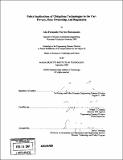Policy implications of ubiquitous technologies in the car : privacy, data ownership, and regulation
Author(s)
Narváez Bustamante, Alex Fernando
DownloadFull printable version (4.717Mb)
Other Contributors
Massachusetts Institute of Technology. Technology and Policy Program.
Advisor
Joseph F. Coughlin.
Terms of use
Metadata
Show full item recordAbstract
Motor vehicle travel is the primary means of transportation in the United States, providing freedom in travel and enterprise for many people. However, motor vehicle accidents are the largest component of unintentional injuries and contribute to a high degree of morbidity and mortality for all ages. This thesis analyzes the relationship between feedback technologies and driver behavior. Based on the findings, policy recommendations were made to help ensure that the privacy and trust of the public are not compromised, as ubiquitous technologies become a reality in automobiles. The thesis provides an overview of the most modem mechanisms available in cars today. Furthermore, this thesis takes the first steps to combining existing technologies into a single system that not only tracks driver behavior, but also provides feedback in the hopes of improving drive performance and safety. The qualitative discussion includes a stakeholder analysis of the prime interests and effects of all parties that are impacted by ubiquitous technologies in the car. The qualitative discussion also contains the results of four focus groups that were conducted to gain first hand insights about the view of the drivers about monitoring technologies in the car. (cont.) This study finds that most drivers have a symbiotic relationship with the technologies that exist in their car; however, drivers feel uncomfortable with a fully automated system. Their concerns rise from the belief that fully automated systems take control away from the driver. Drivers were also concerned about the privacy and security of the data collected and stored by these technologies in their vehicles. These concerns can be addressed within the existing legal framework, but additional regulations also need to be designed because as the technology changes so will the concerns. Therefore, it is important to design policies that are flexible, rather than completely depending on current regulations to address future concerns.
Description
Thesis (S.M.)--Massachusetts Institute of Technology, Engineering Systems Division, Technology and Policy Program, 2006. Includes bibliographical references (leaves 58-61).
Date issued
2006Department
Massachusetts Institute of Technology. Engineering Systems Division; Technology and Policy ProgramPublisher
Massachusetts Institute of Technology
Keywords
Technology and Policy Program.